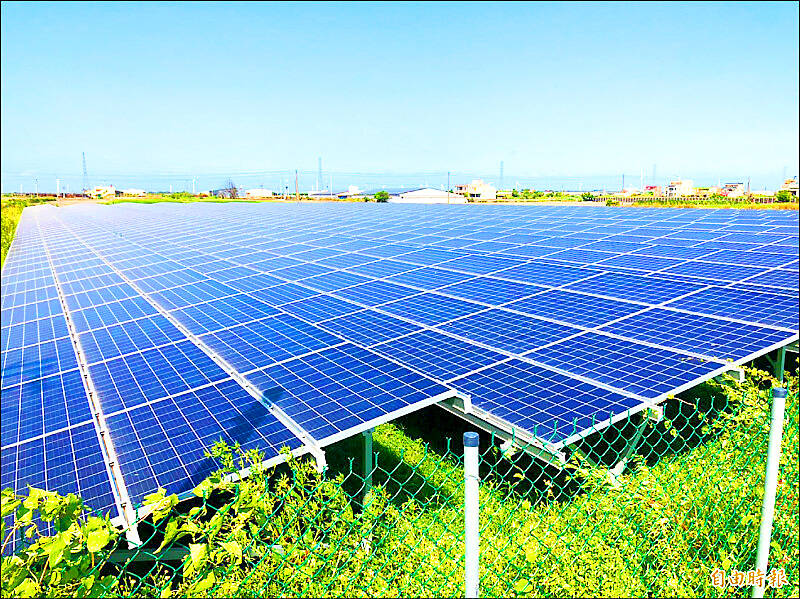A national security crisis could occur due to a high percentage of China-made inverters installed in Taiwan’s solar energy systems, and lawmakers should keep the Ministry of Digital Affairs (MODA) and Taiwan Power Co (Taipower) in check over the issue, an information security expert said on Friday.
National Cheng Kung University electrical engineering professor Li Jung-shian (李忠憲) said in a post on his Facebook page that although laws specifically state that key infrastructure may not contain devices or equipment that would endanger national security, inverters — devices that convert direct electricity generated by solar panels into alternating electricity used by power grids — made by China-based Huawei Technologies Co were predominantly installed in Taiwan’s solar energy systems.
“Power facilities are key infrastructure,” Li said. “Since the equipment made by Huawei is cheaper than devices manufactured by Taiwan’s Delta Electronics, and the MODA does not ban the use of devices made by Huawei, people continue using them after taking the costs into account,” he said.

Photo: Taipei Times file
However, it is not clear what Huawei’s inverters could do in crucial moments, he said.
“National security requires high standards and costs. Legislators who are concerned about national security issues should ask Taipower and the Administration for Cyber Security at the ministry how they plan to handle inverters made by Huawei,” he said. “The ministry receives more than NT$20 billion [US$627.9 million] in funding per year, and it should resolve this type of issues.”
The government should have either a white list or a blacklist of Chinese products, so that people know what to or not to use, Li said.
Without a list, the ministry is practically encouraging everyone to find the cheapest inverters to use, he said.
“Taiwan is expanding the development of green energy. If green energy cannot be used in key moments, I am afraid that the entire Taiwan, including the Taiwan Semiconductor Manufacturing Co, would be in a miserable condition,” Li said.
“If solar energy systems with Chinese inverters generate about 5 percent of the nation’s electricity, and the inverters make it possible to monitor the operation of the system remotely, the system could be set to shut down simultaneously,” Lin said. “Other power generators can shut down as well, and this is a serious national security problem.”
In 2021, inverters made by Huawei were reported to have been installed to the solar panels on top of a building in the Legislative Yuan, which generated concerns about information security breaches.
The Legislative Yuan at the time said its solar energy systems had been procured in April 2017 in accordance with relevant regulations. The inverters were later removed.

SHIPS, TRAINS AND AUTOMOBILES: The ministry has announced changes to varied transportation industries taking effect soon, with a number of effects for passengers Beginning next month, the post office is canceling signature upon delivery and written inquiry services for international registered small packets in accordance with the new policy of the Universal Postal Union, the Ministry of Transportation and Communications said yesterday. The new policy does not apply to packets that are to be delivered to China, the ministry said. Senders of international registered small packets would receive a NT$10 rebate on postage if the packets are sent from Jan. 1 to March 31, it added. The ministry said that three other policies are also scheduled to take effect next month. International cruise ship operators

NUMBERS IMBALANCE: More than 4 million Taiwanese have visited China this year, while only about half a million Chinese have visited here Beijing has yet to respond to Taiwan’s requests for negotiation over matters related to the recovery of cross-strait tourism, the Tourism Administration said yesterday. Taiwan’s tourism authority issued the statement after Chinese-language daily the China Times reported yesterday that the government’s policy of banning group tours to China does not stop Taiwanese from visiting the country. As of October, more than 4.2 million had traveled to China this year, exceeding last year. Beijing estimated the number of Taiwanese tourists in China could reach 4.5 million this year. By contrast, only 500,000 Chinese tourists are expected in Taiwan, the report said. The report

HORROR STORIES: One victim recounted not realizing they had been stabbed and seeing people bleeding, while another recalled breaking down in tears after fleeing A man on Friday died after he tried to fight the knife-wielding suspect who went on a stabbing spree near two of Taipei’s busiest metro stations, Taipei Mayor Chiang Wan-an (蔣萬安) said. The 57-year-old man, identified by his family name, Yu (余), encountered the suspect at Exit M7 of Taipei Main Station and immediately tried to stop him, but was fatally wounded and later died, Chiang said, calling the incident “heartbreaking.” Yu’s family would receive at least NT$5 million (US$158,584) in compensation through the Taipei Rapid Transit Corp’s (TRTC) insurance coverage, he said after convening an emergency security response meeting yesterday morning. National

The Forestry and Nature Conservation Agency yesterday launched a gift box to market honey “certified by a Formosan black bear” in appreciation of a beekeeper’s amicable interaction with a honey-thieving bear. Beekeeper Chih Ming-chen (池明鎮) in January inspected his bee farm in Hualien County’s Jhuosi Township (卓溪) and found that more than 20 beehives had been destroyed and many hives were eaten, with bear droppings and paw prints near the destroyed hives, the agency said. Chih returned to the farm to move the remaining beehives away that evening when he encountered a Formosan black bear only 20m away, the agency said. The bear